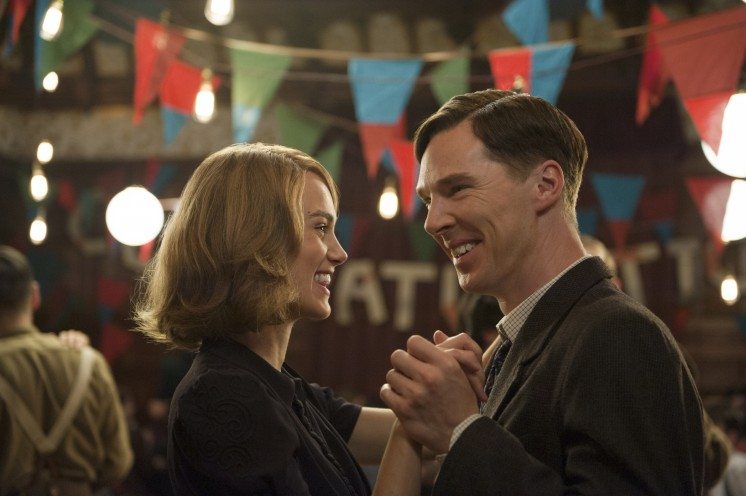The Imitation Game
Director: Morten Tyldum
Cast: Benedict Cumberbatch, Keira Knightley, Matthew Goode
Length: 114 minutes
Country: UK, USA
It is hard to believe that homosexuality was illegal until 1967 in this country. Alan Turing was a gay man in a homophobic world, and Morten Tyldum’s new film The Imitation Game tells his story. In flashbacks we see Turing as a child (Alex Lawther, later Benedict Cumberbatch) being bullied by brutes and bores, causing him to withdraw into mathematics and problem solving. During WW2 he was hired by British intelligence to do one thing: break the German Enigma code. His new world of military commanders (one of whom is played by Charles Dance) and spies (Mark Strong features) also brought him into contact with his team of other mathematicians and code breakers.
Turing hires Joan Clarke (Keira Knightley), and theirs becomes the most involving and important relationship in the film. Her induction into the team is preceded by an unforgettable moment of sexism; a gentle reminder that homophobia was not the only widespread form of discrimination among the intelligentsia in those days. It is not too much of a spoiler to say that together they cracked the Enigma code and helped shorten the war by, and estimates vary, two years. Historians have suggested that this may have saved up to 14 million lives.
Turing was rewarded for his efforts by being brutally treated by the government of the country he had done so much for. There is an alarming number of people who do not know Turing’s story, and I will stay away from spoilers except to point out to that two scenes in this film, one featuring apples, and the other a bottle of cyanide, foreshadow his ultimate fate. The final scene, which was always going to be difficult to shoot, managed to resist the allure of easy sentimentality thanks to the superb acting of Cumberbatch who gives a remarkable performance all-round. Turing’s life-long stutter realistically portrayed by Cumberbatch, becoming heightened in stressful moments with superb prowess.
The film is not without its flaws. While Keira Knightley gives a solid performance, a braver film might have cast a prominent male in Turing’s life to play the lead alongside Cumberbatch.
However, the film is not without its flaws. While Keira Knightley gives a solid performance, a braver film might have cast a prominent male in Turing’s life to play the lead alongside Cumberbatch. Much is made of Turing and Clarke’s crossword expertise, when in reality crosswords played a very small part of each of their lives. Perhaps as a response to the crossword ploy, there have even been complaints that the technical discussions between the code breakers have been dumbed down. A friend of mine was impatient with this criticism, and she pointed out that, “It is a film about intellectuals, not a film for intellectuals.” My final point would be that at 114 minutes it is fairly short for a biopic about such a titanic figure in history, and an extra half an hour might have helped develop some of the minor characters and themes.
The script and ordering of scenes deliberately builds up the theme of the differences between humans, machines and the thinking processes of each. This refracts and reflects the discussion of differences in sexual orientation, and the film has managed to draw the two main threads of Turing’s life (his work in computer science, and his private life) and weave them together, thereby making itself immune to the accusation of being two different films stitched together.
The Imitation Game is a celebration of difference, and a tribute to a man whose disinterested scientific endeavours were used to topple the menace of the discrimination-obsessed Third Reich. It is just a shame that he was brought to his knees by the discriminatory laws of the country who owed him everything.
Image Source: The Weinstein Company


Comments